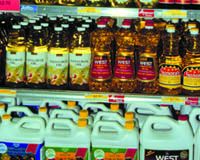Quiz Format
History of
Agriculture Quiz
Livestock Quiz
Crop Quiz
Soil Quiz

1. The availability of out-of-season foods in Canada in the winter, such as fresh lettuce, tomatoes or even bananas is a result of ***. a. improved transportation systems
2. Basic nutrients found in food that are required by the body include ***.
a. milk, fibre, protein and fats
3. Glycogen is ***.
a. stored as fat in the liver
4. When you eat an apple, you are consuming mostly ***.
a. water
5. All the essential animo acids would most likely be found in one serving of ***.
a. peanuts
6. The meal that would take the most exercise to burn off would be one that contains ***.
a. 20 g carbohydrates, 45 g protein, 13 g fat and 8 g of alcohol
7. The making of strawberries and rhubarb into strawberry/rhubarb pie is an example of a *** food industry.
a. primary
8. Canola oil is considered a "healthy" oil due to its high levels of ***.
a. oleic acid
9. Saskatchewan's meat industry contributes *** to the province's agriculture production.
a. 12.5%
10. Milk and ice cream processing involves both homogenization and pasteurization. Homogenization is ***.
a. evaporation of liquid under vacuum leaving a concentrate
|
